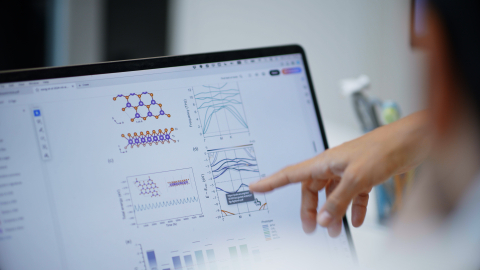On February 11 it’s the ‘International day of women and girls in science’. A perfect occasion to put Ceren Tayran in the spotlights. Since October 2023 Ceren works as a postdoctoral researcher in the Autonomous Energy Materials Discovery group at DIFFER’s Chemical Energy department. What does it mean to her, being a woman working in science?
Can you tell us something about your expertise?
“I am a computational material science expert. Particularly electronic, optical, magnetic, thermodynamic and superconducting properties of materials with methods based on Density Functional Theory and Molecular Dynamics Simulations based on Machine-Learned Force Fields.
At DIFFER, I have been focusing on plasma-facing materials for nuclear fusion. As we know, nuclear fusion holds immense promise as a clean and sustainable energy source for the future. A key challenge is to find materials that can survive the extreme conditions inside a fusion reactor. My research focuses on tungsten, a promising material for this purpose.
I use computer modeling to simulate how tungsten and its alloys behave when exposed to the harsh environment of fusion reactors, particularly the impact of high-energy neutrons. This helps us understand how to make these materials more durable and efficient, ultimately bringing us closer to realizing the potential of fusion energy.”
What does your academic career look like?
“My academic journey began in Turkey, where I completed my undergraduate and graduate studies in Physics, followed by a PhD specializing in condensed matter physics, which included a secondment at Michigan State University. During my master's studies, I started working as a research assistant in the Department of Physics at Gazi University in Ankara. Fortunately, I could continue my academic career at the same institution, eventually earning the title of Associate Professor.”
In 2023, you started working at DIFFER. How come?
“When I saw the post-doc position at DIFFER, I was excited about the opportunity to apply my expertise in materials science and broaden my network by collaborating with internationally recognized scholars and researchers. The role has allowed me to contribute to innovative research and focus on a new area of study: fusion materials. The prospect of expanding my knowledge and being involved in such impactful work was a major driving force behind my decision to apply.”
Who do you primarily work with?
“My AMD group colleagues and I focus on developing and using predictive methods for the discovery of materials for energy applications. My supervisor is Süleyman Er, group leader of the Autonomous Energy Materials Discovery (AMD) group and head of DIFFER’s Chemical Energy department. I find the atmosphere in my group highly positive and supportive. Everyone’s contributions are recognized and personal development is valued. That’s a great boost for my own motivation.”
At DIFFER, a large part of your colleagues are men. What's that like for you?
“Indeed, it's something observable, but this hasn’t really affected me or my work. Of course, gender equality is always pursued. I believe the academic world is one of the least biased environments. In society there's also a growing awareness about avoiding gender discrimination. DIFFER is an institute that actively fosters diversity and promotes gender equality, creating an inclusive environment where everyone’s talents are valued.
The atmosphere at DIFFER is positive and friendly, and what stands out the most is the mutual respect among everyone. No matter which department at DIFFER you go to, you are always supported. Also the resources provided by DIFFER are truly exceptional. All you have to do is focus on your work. This is what makes DIFFER a nice place to work.”

What about working in The Netherlands?
“The Eindhoven region is an international environment, where lots of people are used to communicate in English. One important aspect for me when I started here, was being able to express myself. I initially thought communicating in English might hold me back, but I’ve realized that no one judges, and everyone listens respectfully. Also outside DIFFER, where people are really open to people from abroad. It makes me want to immerse myself more in the Dutch culture.”
What is your message to (female and male) PhD students?
“The PhD journey can be tough, with long years or hard work. There are moments when you feel like giving up, but at the end of the road, the joy of doing science is truly hard to find anywhere else. Of course, this is only true if you are pursuing your PhD with genuine passion and not as ‘just a job’. Having colleagues and a supervisor with whom you can share your work, exchange ideas, and receive support is invaluable.
My advice is to be original; never imitate others. During my PhD studies, I struggled with balancing my personal life alongside my academic work. It’s easy to forget that life continues outside of your PhD, but finding that balance is crucial.”
Author: Rianne van Hoek
Go to the News page.